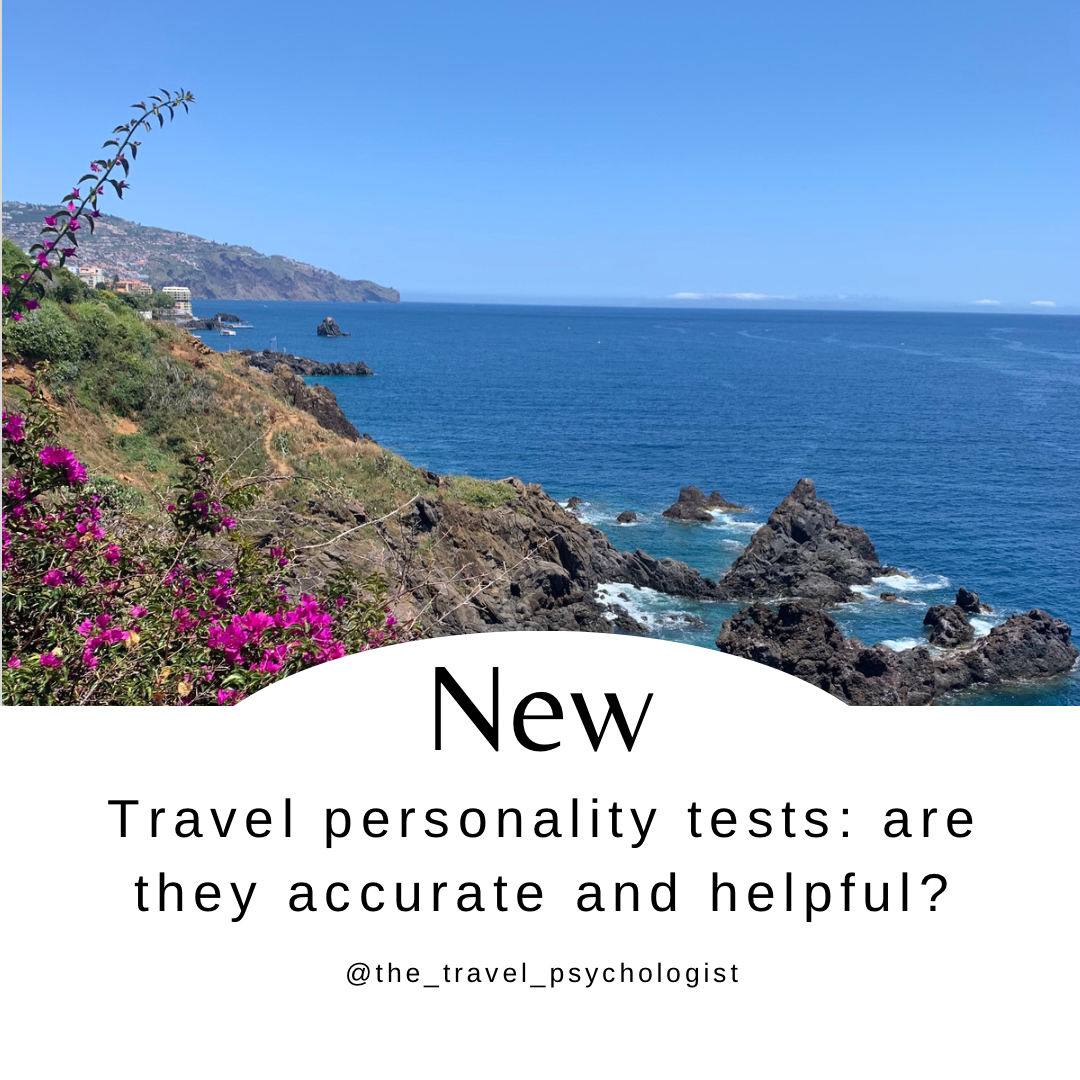Dr Charlotte Russell, Clinical Psychologist and Founder
You have probably come across personality tests and quizzes online and on social media. The idea is appealing; answer a few short questions and the test will analyse your responses and give you feedback on your ‘personality’ and perhaps suggest some options for you. Sometimes these are presented in a light-hearted way, and sometimes, they seem quasi-scientific. To the untrained eye this can sometimes be hard to decipher. In this article I’m going to talk you through the science around personality research and help you to navigate the world of travel personality tests and quizzes.
What is personality?
Anyone who has studied psychology will have a good understanding of what we call individual differences. This is the idea that we all differ due to our temperament and experiences, and that as a result we will have different responses to the same situations.
Personality is an important way in which we differ from one another. It means we have internal tendencies that lead to us responding in certain ways across different situations. These ‘traits’ are thought to be relatively stable across our lifetime. I’ve written in depth about personality here, but to summarise I want you to understand that even the best personality tests are not great at predicting behaviours. As humans beings we are complex and there are lots of factors that contribute to how we behave.
How are personality tests developed?
Genuine scientific research into personality requires huge numbers of participants to spot differences and trends between people and groups. That is why it is so time consuming and costly to do.
The real value of personality tests stems from understanding where we are in relation to other people, or the general population. Knowing you are highly introverted, for example can help you to understand why you may feel overwhelmed by constant meetings at work, when others don’t. This understanding can help you to plan your activities in a way that best works for you. As an introvert, for example, this might involve small chunks of time throughout your day to focus on detailed work and to recharge your social batteries.
The reality is however that most people will not be on the extreme end of any of the dimensions of personality. Personality factors are normally distributed, which means that most people will be somewhere in the middle. For example, having a slight tendency towards introversion rather than being highly introverted. Or being generally open to experience but also liking a bit of predictability and comfort.
Are travel personality tests accurate?
In a word, no. The travel industry do not have the time, budget or incentive to do or fund scientific research into how personality affects our travel choices!
I am sometimes contacted by public relations professionals on behalf of travel companies. They usually want to do ‘research’ into travel personalities as part of their advertising campaigns. This sounds great in theory but it usually turns out that they don’t have the time or budget that scientific research really requires. So whenever you are faced with a ‘travel personality test’, my advice would be to take it with a pinch of salt!
However, it wouldn’t be scientific or fair of me to comment on travel personality tests without trying a few myself. As part of the research for this article, I took 5 travel personality tests that came up on the first page of Google. Some of them seemed ok, and some of them were just plain nonsense!
The most frustrating thing I found was that many tried to create false choices, for example having to choose between enjoying visiting the city or nature. As human beings we can enjoy both of these!
Why do we like personality tests?
This excellent article by Psychology Today gives a few reasons why We Like Personality Tests, Even the Bad Ones. The main reasons that these tests are so popular is that we want to learn something new about ourselves. This is understandable, and I can see the appeal of wanting to go through a process of responding in a way that feels scientific, to get some kind of insight into ourselves.
We also want to have simple ways of understanding people, when people’s behaviour can be difficult and confusing to understand. I can empathise with this; spending 20 years in psychology has certainly given me a better insight into human behaviour but it is still confusing at times!
If I’m going to take a travel personality test, which one would you recommend?
During my research, one test stood out as being interesting: The Travel Personality Test by Truity. This test is based on personality dimensions which are rooted in scientific research, known as the Big-Five. I describe these in my Travel & Personality introduction. If you are going to take a travel personality test, this is one of the most helpful, but I would still encourage you to exercise healthy skepticism!
If a travel personality test can’t tell me what I like then how do I know!?
Like anything in life it takes time and experience to really get to know our own preferences, and what works best for us. It is important to try different types of travel and to see what we like. Travel is part of the joy of getting to know ourselves and this can be a lovely experience. However it does inevitably mean experiencing a few trips that aren’t our cup of tea along the way.
When thinking about your own preferences, the following domains can be helpful to think about:
Planning vs Spontaneity
How much we plan is likely to have a correlation with the conscientiousness domain of personality. People who are highly conscientious tend to be reliable, careful and diligent. It makes sense that people with this personality trait will tend to plan more.
The type of trip is also important. Some trips certainly require more planning to get the most out of them. For example, if you have two days in New York city and you are staying in a costly hotel, you are going to want to spend your time ticking off the sights. This shows how we may have a natural affinity for planning and this may be increased or decreased by the type of trip we are taking.
On the other hand, sometimes it can be helpful to go with the flow of how we are feeling rather than to overly plan. I wrote more about this in should I plan or be spontaneous with my trips?
Adventure vs relaxation
This is one of those domains where most people will fall in the middle, enjoing a good balance of relaxation and adventure. Not many people fall on the extreme end of the spectrum here, either preferring adrenaline filled adventures or relaxing in a spa for an entire trip.
So the challenge here is finding the right balance for us. Dr Jill wrote about this in her article how can I balance relaxation and adventure when I travel?
Independence vs organised activities
Are you someone who likes to organise things yourself or do you like to have everything available to you? All inclusive resorts are an example of the latter and there is no judgement here. Perhaps you have a busy job or have had a difficult year. In the words of my good friend and fellow psychologist Dr Hannah, “sometimes it is nice not to have to make any choices”!
Think about trips you’ve had in the past when the level of planning was ‘about right’ for you. This can help to guide your decisions about how much to plan in. Also think about what you have going on in your life at the moment and what you need; if you are feeling stagnant a full itinerary might be just right to re-ignite your curiosity. On the other hand, if you are feeling overwhelmed and burned out, allowing time to chill will be important.
Activity types
Do you like a range of activities or are you super enthusiastic about one area and want to dedicate your time to that. Being highly curious, I’m someone who likes to mix it up. For example, I like cultural activities but if I’m exploring 10 temples, I’m going to feel templed-out! On the other hand, my friend and fellow blogger Amy at Templeseeker it is all about the temples.
For me personally I like a mix of temples, nice restaurants to eat at and maybe a wine tour, some nature activities, a yoga class, a hip coffee shop and maybe even a cheeky massage to boot! I’m yet to find a country that offers all of these so I continue to diligently search!
Thinking about your previous trips and what has worked well, and not so well for you is important here. Also be open to new options; maybe you’ve never tried a food tour and want to give it a go. Maybe the place you’re visiting has some unique activity to try. The famous taboggan in Funchal, Madeira is one of my favourite examples of this. Yes these new and unique activities might be a little bit touristy, but they are famous for a reason and can be a great way to remember the place, and to have some fun!
Conclusion
Travel personality tests are unlikely to be accurate and need to be taken with a sizable pinch of salt! However they can provide us with an opportunity to reflect on our travel style. We can also use our previous experiences to think about what works well for us. This is a great way to get the balance right on future trips.
If you liked this article check out my Travel & Personality introduction



